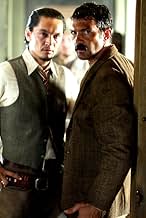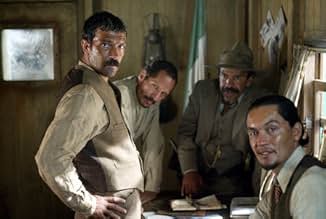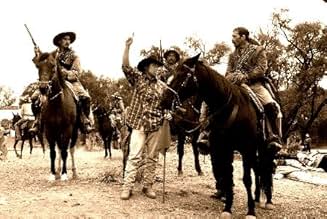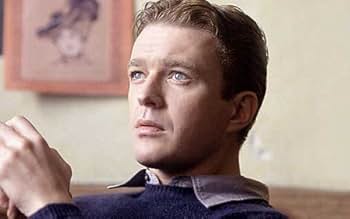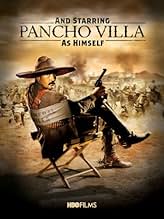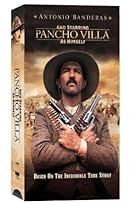IMDb RATING
6.5/10
3.8K
YOUR RATING
Hollywood makes a deal with Mexican revolutionary Pancho Villa to film his war and recreate his life.Hollywood makes a deal with Mexican revolutionary Pancho Villa to film his war and recreate his life.Hollywood makes a deal with Mexican revolutionary Pancho Villa to film his war and recreate his life.
- Won 1 Primetime Emmy
- 8 wins & 23 nominations total
Anthony Head
- William Benton
- (as Anthony Stewart Head)
Pedro Armendáriz Jr.
- Don Luis Terrazas
- (as Pedro Armendáriz)
- Director
- Writer
- All cast & crew
- Production, box office & more at IMDbPro
Featured reviews
I don't know how historically accurate this film is, although I know the basic plot is correct. This was an entertaining look at Villa's Hollywood escapade, and Banderas' performance is, as usual, believable, funny, horrifying, likable, and despicable. Sometimes all within just a few minutes.
Highly recommended to film history buffs and Antonio Banderas fans!
Highly recommended to film history buffs and Antonio Banderas fans!
I did not expect the premise of the movie to work but it did. This story line and the wonderful way it was developed and portrayed on screen is so much missing in the fare presented by the major studios any more. I had to put my book down! Antonio Banderas so thoroughly submerges himself into the character that after awhile he BECAME Pancho Villa. He made Pancho Villa at once hero and villain; resolute and uncertain; stoic and tender. Best of all, there was no attempt to wrap the feature up in a tidy bow at the end.
I have my TIVO permanently locked on HBO.
I am curious about the original film - The Life of General Villa (1914) - in which IMDB shows only two performers, Pancho Villa and Raoul Walsh.
I have my TIVO permanently locked on HBO.
I am curious about the original film - The Life of General Villa (1914) - in which IMDB shows only two performers, Pancho Villa and Raoul Walsh.
The film had not only good, believable action, but also the thread of underlying concerns in the U.S. at that time of "what might be in it" for the USA. Availability of oil was titillating. The film brought out our country's fascination for the bloody revolution Villa was waging and, at the same time, whether he might be a threat to our own economic interests. The film was about making a film with the backdrop of a genuine revolution going on, and trying to merge some "acting" along with the horrors of live fighting. The "carrot" for Villa was that a film of his efforts, however horrendous, would help make him a hero in the U.S. where some politicians were calling for his pursuit and elimination. D.W. Griffith, the film maker, becomes disillusioned with Villa after his final victory when he shows his viciousness in a blatant manner by personally shooting a grieving widow who tries to physically attack him with her hands. Though this heinous act was caught on film, it is edited in a manner that shows it as an action by the Mexican forces Villa was combating. After all, Villa's "heroism" is at stake here!
Every hero is guilty of some atrocities, and Pancho Villa was no exception. Antonio Banderas delivers a convincing performance as a complicated man who had the brilliance to use the majesty of his own personality to help finance a peasant revolution in Mexico.
As docudramas go, this one is very well balanced ... it reveals the darker side of a legend, the people who tried to manipulate him, and the people he manipulated. Although the original film, the making of which is the heart of this story, has been lost to the ages, it is nonetheless a moving story.
How much is history and how much is Hollywood? Who can say? All I know is that I was more impressed than I expected to be, and more than just being entertained and educated, I was given a lot of food for thought. I sincerely hope that a Spanish language version of this will be available so that the people of Mexico can learn a different version of his story than the one that is in the books in their schools.
This was two hours of my life that I'm glad I spent in front of the screen, and I thank everyone involved for the experience. It is not the best movie I've seen this year, nor will it ever be on my Top Ten list, but it *IS* a very good example of what cinema *SHOULD* be, and all too often is not ... a thought provoking drama that tells a slightly different story than the one we thought we knew.
As docudramas go, this one is very well balanced ... it reveals the darker side of a legend, the people who tried to manipulate him, and the people he manipulated. Although the original film, the making of which is the heart of this story, has been lost to the ages, it is nonetheless a moving story.
How much is history and how much is Hollywood? Who can say? All I know is that I was more impressed than I expected to be, and more than just being entertained and educated, I was given a lot of food for thought. I sincerely hope that a Spanish language version of this will be available so that the people of Mexico can learn a different version of his story than the one that is in the books in their schools.
This was two hours of my life that I'm glad I spent in front of the screen, and I thank everyone involved for the experience. It is not the best movie I've seen this year, nor will it ever be on my Top Ten list, but it *IS* a very good example of what cinema *SHOULD* be, and all too often is not ... a thought provoking drama that tells a slightly different story than the one we thought we knew.
Pancho Villa is a Mexican general who makes a deal with a movie studio where he will get $25,000 in gold, in exchange for the rights to film his battles. This is quite an absurd idea, especially as it leads to certain battles being 'made to measure' for the camera, and it becomes even more absurd when you realize that this is actually a true story. Yes, that's right; And Starring Pancho Villa as Himself is actually a film about the making of another film from 1914, known as 'The Life of General Villa'. The film is a little like Shadow of the Vampire, in that it depicts the making of an old film, using today's actors to play the people involved in the making of the old film. This film was made for American TV, and to me this seems a great injustice and a commentary on what the American film industry thinks of it's audience. Like 1995's Citizen X, the only reason that I can think of as to why this wasn't given a cinema release is that it would be lost on it's potential audience.
The film features a number of familiar faces. People that you often see in films, but don't know their names. Here we have the excellent Alan Arkin, who's one of my favourite 'smaller' stars without a doubt, Jim Broadbent, Eion Bailey and Anthony Head from the rubbish 'Buffy' program also makes an appearance. The real acting plaudits, however, go to Antonio Banderas for his complete embodiment of the title character. I've heard a number of people say bad things about Antonio in this movie, but I have no idea why; here he gives what is probably the best performance of his career. In fact, he is so good that after a while you forget that you're watching an actor and it actually seems like Pancho Villa really is starring as himself. This does the movie no end of favours on the reality front as it continually switches between the movie that they're making and the reality of Pancho Villa's revolution. This movie does an excellent job of catching an authentic Mexican atmosphere, and this is made even finer by way of an excellent, subtle, score.
The battles in the film are excellently staged, and also quite violent and bloody; which is always nice to see. That came as something of a surprise to me as, with this being a TV movie, I wasn't expecting the battles to be particularly well done. The message that this film has seems to be that people can be made to believe anything. As one character professes at one point in the film, "the lens is mightier than the sword", and through the way that the film shows the difference between what the film that the characters are making shows and what the truth is; this message comes across loud and clear.
Please don't miss this movie because it is cursed with '(TV)' after it's title; as although it isn't a masterpiece, it most definitely is well worth seeing.
The film features a number of familiar faces. People that you often see in films, but don't know their names. Here we have the excellent Alan Arkin, who's one of my favourite 'smaller' stars without a doubt, Jim Broadbent, Eion Bailey and Anthony Head from the rubbish 'Buffy' program also makes an appearance. The real acting plaudits, however, go to Antonio Banderas for his complete embodiment of the title character. I've heard a number of people say bad things about Antonio in this movie, but I have no idea why; here he gives what is probably the best performance of his career. In fact, he is so good that after a while you forget that you're watching an actor and it actually seems like Pancho Villa really is starring as himself. This does the movie no end of favours on the reality front as it continually switches between the movie that they're making and the reality of Pancho Villa's revolution. This movie does an excellent job of catching an authentic Mexican atmosphere, and this is made even finer by way of an excellent, subtle, score.
The battles in the film are excellently staged, and also quite violent and bloody; which is always nice to see. That came as something of a surprise to me as, with this being a TV movie, I wasn't expecting the battles to be particularly well done. The message that this film has seems to be that people can be made to believe anything. As one character professes at one point in the film, "the lens is mightier than the sword", and through the way that the film shows the difference between what the film that the characters are making shows and what the truth is; this message comes across loud and clear.
Please don't miss this movie because it is cursed with '(TV)' after it's title; as although it isn't a masterpiece, it most definitely is well worth seeing.
Did you know
- TriviaWhile filming a battle between the forces of Pancho Villa and federal troops near Ojinaga for Life of Villa (1912), cameraman Charles Rosher was captured by federal soldiers and brought before their commanding general. Rosher thought he was about to be executed as a spy, and things didn't look too good for him until the Mexican general noticed Rosher's Masonic pin in his lapel. The general then gave Rosher the Masonic greeting; it turned out he was a Mason, too. Instead of being shot as a spy, Rosher was treated as a guest, and was later released after the Mexican government made a deal with the American government that allowed their troops to cross into American territory in order to outflank Villa's forces and attack them from the rear.
- GoofsAt the beginning of the film, Pancho Villa makes a remark about Charlie Chaplin. This scene takes place sometime between the end of 1913 and the beginning of 1914. Chaplin made his screen debut in January 1914. In any case, there's no chance that Pancho Villa would have known Chaplin's films, considering that at that time (1914) the future star was just only another Keystone employee.
- Quotes
Pancho Villa: [after hearing a gunshot] Sometimes justice can be loud.
- ConnectionsFeatured in The 56th Annual Primetime Emmy Awards (2004)
- SoundtracksTierra Mestiza
Written by Gerardo Tamez
Perforrmed by Los Toenegritas
Courtesy of Directóra del Toenegre
Details
- Release date
- Countries of origin
- Official site
- Languages
- Also known as
- And Starring Pancho Villa as Himself
- Filming locations
- Production companies
- See more company credits at IMDbPro
- Runtime
- 1h 52m(112 min)
- Color
- Aspect ratio
- 1.78 : 1
Contribute to this page
Suggest an edit or add missing content


